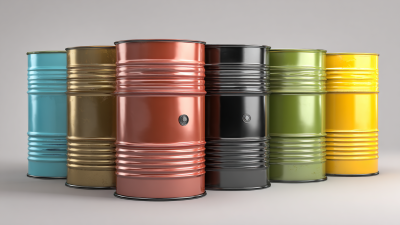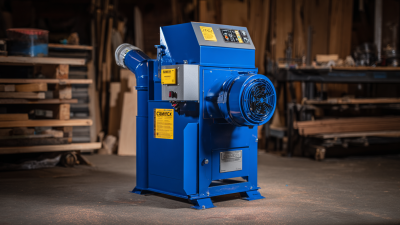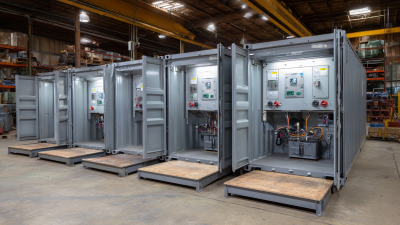Essential Guide to Choosing the Right Dust Collector Spare Parts for Your Industry
Table of Contents
- Understanding the Role of Dust Collectors in Various Industries
- Identifying Key Spare Parts Needed for Efficient Dust Collection Systems
- Evaluating Performance Metrics for Dust Collector Spare Parts Selection
- Assessing Compatibility of Spare Parts with Different Dust Collection Systems
- Cost-Benefit Analysis of Investing in Quality Spare Parts for Dust Collectors
- Maintaining Compliance with Industry Standards for Dust Collector Components
- Maximizing Efficiency: Understanding the Role of Cartridge Filters in Dust Collection Systems
- FAQS
- Conclusion
- Related Posts
In the world of industry, making sure dust collection systems work well is super important for keeping workplaces safe and efficient. Picking the right spare parts for your dust collectors isn’t just a small detail — it’s key to keeping everything running smoothly. Here at Shanghai Jiongcheng Industrial Co., Ltd., we get how crucial reliable equipment is, especially in industries that need top-notch lubrication solutions. Our experience with compressor lubricants, vacuum pump oils, and refrigerated compressor lubricants lines up perfectly with what businesses relying on good dust collection systems need. Thanks to our cutting-edge research and manufacturing technology, we're dedicated to providing high-quality lubricants that help extend the life and performance of your equipment, including dust collectors. This handy guide is here to walk you through what to consider when choosing the right Dust Collector Spare Parts, so industries can keep their operations running optimally and make workplaces healthier and safer for everyone.

Understanding the Role of Dust Collectors in Various Industries
Industrial dust collectors are pretty essential across all sorts of industries—they really help keep workplaces safe and clean. Basically, they handle airborne pollutants that come from industrial processes, which not only improves safety for workers but also helps companies stay in line with environmental rules. These days, more folks are aware of the health risks linked to dust exposure, and that’s really boosting the global market for dust collectors. In fact, experts predict it’ll grow from around $8.27 billion in 2025 to nearly $12 billion by 2032.
When you're picking spare parts for your dust collection system, it’s super important to think about what your specific industry needs. Different processes throw off different types of dust, so you might need specialized filters or tech. Here are a couple of tips I’ve found helpful:
First off, look at the type of dust your operation produces. Think about things like particle size, what it’s made of, and how much moisture is in it. Knowing this stuff helps you pick filters and parts that work well together and keep your system running smoothly.
Second, don’t skimp on quality. Always go for parts that meet industry standards for performance and safety. Spending a little extra on good quality parts can save you a headache later—less downtime, fewer issues, and you’ll stay on the right side of regulations. It’s worth it in the long run.
Identifying Key Spare Parts Needed for Efficient Dust Collection Systems
Picking out the right spare parts for your dust collection systems? It’s super important to focus on those key components that keep things running smoothly and safely. You know, dust buildup is a real pain—it not only messes with health but can also mess up your equipment’s performance. Getting a good handle on essentials like filters, motors, and duct fittings can really boost how well your dust control works. Each of these parts plays a part in keeping airflow steady and filtration effective, which helps cut down on dust-related hazards.
And honestly, how well your dust collection system works can have a real impact on your overall productivity. Especially these days, in industries like ship loading or unloading, controlling dust is more critical than ever. Choosing the right spare parts means your operations run more smoothly—less downtime, safer work conditions, you name it. Keeping an eye on your system’s components and swapping out parts before they break down can make a big difference in keeping everything up to standard and safe.
So, regular checks and timely replacements aren’t just good practice—they’re essential to keep your dust control system performing at its best and meeting safety rules. Trust me, a little maintenance goes a long way!

Evaluating Performance Metrics for Dust Collector Spare Parts Selection
When you're choosing spare parts for your dust collector in the industry, taking a close look at how they perform is super important. These performance factors can really tell you a lot about how efficient, long-lasting, and effective the parts will be in your overall dust collection setup. Things like airflow rate, filter efficiency, and how often they need maintenance—it's a good idea to analyze these carefully to make sure the parts actually fit what your operations require. Just like in the renewable energy world, where they’re all about optimizing system performance, industries that rely on dust collection can benefit from that same kind of thorough approach.
A few tips to help you pick the right spare parts:
- First off, check your current system’s airflow needs—make sure the new parts can handle that capacity without messing up performance.
- Look into how long the parts typically last and how effective their filters are—this can save you from changing things out all the time and help with planning maintenance.
- Also, keep an eye out for new tech or innovations in spare parts that can boost their durability and cut down on operational costs.
By keeping tabs on these key performance metrics, you’ll be in a much better position to make smart decisions, improve your dust collection system’s efficiency, and cut down on downtime or pesky interruptions. It’s all about staying ahead of the game and making your operations run smoother and more cost-effective.
Assessing Compatibility of Spare Parts with Different Dust Collection Systems
When you're shopping for spare parts for your dust collectors, it's super important to double-check if they’ll actually work with your existing setup. You see, different types of dust collection systems—like baghouses, cyclones, and cartridge filters—each have their own unique requirements. Each kind uses certain components that are tailored to perform best under specific conditions. For example, the filtration media in a baghouse needs to match the kind of dust you're collecting, and cyclones need particular inlet shapes to get the dust out of the air stream efficiently.
On top of that, don’t forget to always look at the manufacturer’s guidelines when replacing parts. The spares should fit physically, sure, but they also need to meet certain performance standards to keep everything running smoothly. Using parts that aren’t compatible can seriously tank your system’s performance, rack up maintenance costs, or even cause equipment breakdowns. So, taking the time to understand your dust collection system's design and matching it up with the right spare parts is key. Doing that will help you make smarter choices and keep things running effectively—without the headaches.
Essential Guide to Choosing the Right Dust Collector Spare Parts for Your Industry - Assessing Compatibility of Spare Parts with Different Dust Collection Systems
| Spare Part Name | Compatible Models | Material | Filtration Efficiency (%) | Operating Temperature (°C) |
|---|---|---|---|---|
| Filter Bag | Model A, Model B | Polyester | 99.9 | 80 |
| Dust Collection Blower | Model C, Model D | Cast Iron | N/A | 100 |
| Cyclone Separator | Model E, Model F | Steel | N/A | N/A |
| Control Panel | Model G, Model H | Plastic | N/A | 50 |
| Gasket | Model I, Model J | Rubber | N/A | N/A |
Cost-Benefit Analysis of Investing in Quality Spare Parts for Dust Collectors
 When it comes to keeping your dust collectors running smoothly and efficiently, investing in top-notch spare parts really makes a world of difference. A study from the Industrial Air Quality Association found that using the right spare parts can cut down maintenance costs by up to 30% and even extend the life of your equipment. This is especially true for industries that depend heavily on dust collection systems—think manufacturing, pharmaceuticals, and food processing. Picking high-quality components isn't just about performance; it also means less downtime, so your production line keeps moving without hiccups.
When it comes to keeping your dust collectors running smoothly and efficiently, investing in top-notch spare parts really makes a world of difference. A study from the Industrial Air Quality Association found that using the right spare parts can cut down maintenance costs by up to 30% and even extend the life of your equipment. This is especially true for industries that depend heavily on dust collection systems—think manufacturing, pharmaceuticals, and food processing. Picking high-quality components isn't just about performance; it also means less downtime, so your production line keeps moving without hiccups.
At Shanghai Jiongcheng Industrial Co., Ltd., we totally get how important good lubrication is for optimizing dust collector performance. Our advanced lubricants for compressors and vacuum pumps are specially designed to handle high temperatures and keep their viscosity intact — stuff that's vital for your systems to run reliably. Studies show that proper lubrication can boost equipment efficiency by up to 15%. So, by choosing quality spare parts and lubricants, industries can see a pretty sweet return on investment. Honestly, those initial costs are minor compared to the long-term savings and boosted productivity you'll enjoy.
Maintaining Compliance with Industry Standards for Dust Collector Components
Picking the right spare parts for dust collectors isn't just about keeping things running — it’s actually pretty crucial if you want to stay within industry standards, which can vary a lot depending on the sector. For example, OSHA (you know, the Occupational Safety and Health Administration) has strict rules about air quality at work to prevent folks from being exposed to dangerous dust and particles. That means components like filters and fans need to perform really well and meet certain standards. The American Industrial Hygiene Association points out that if dust control systems aren’t well-maintained, airborne contaminants can exceed safe limits, putting workers’ health at risk.
On top of that, the EPA’s rules about particulate matter mean industries have to use efficient dust collection setups to keep pollution in check. Choosing certified spare parts for your dust collectors isn't just about keeping the equipment working; it’s also about playing by the rules. According to a report from NIOSH, upgrading to high-efficiency HEPA filters can really boost dust removal, making the workplace safer and helping meet federal laws. If you invest in reliable, quality components, you’re not only protecting your team but also dodging hefty fines or even shutdowns for non-compliance — it’s a win-win all around.
Maximizing Efficiency: Understanding the Role of Cartridge Filters in Dust Collection Systems
In modern dust collection systems, cartridge filters play a pivotal role in maximizing operational efficiency. The unique concave fold pattern design of these filters ensures that the entire filtration area is utilized, achieving 100% effective filtration. This innovative approach allows for optimal fold spacing, which contributes to a uniform filtration process across the surface area. As a result, users benefit from reduced pressure differences within the filter elements, thereby stabilizing airflow and enhancing the overall performance of the dust collection system.
Durability is another crucial aspect of cartridge filters, as they are constructed using advanced foreign technology, coupled with specialized adhesive for robust bonding. This combination not only extends the service life of the filters but also ensures they can withstand challenging operational conditions. The thoughtful design features, such as the curved transition at the folding top, increase the effective filtration area, which further maximizes filtration efficiency. Additionally, the rich elasticity and low hardness of the sealing ring improve the overall sealing performance, ensuring that the system operates efficiently and minimizes downtime for maintenance.
FAQS
: Industrial dust collectors manage airborne pollutants from industrial processes, ensuring a safe and clean workspace, improving worker safety, and helping with compliance to environmental regulations.
The market is expected to grow due to increasing awareness of health risks associated with dust exposure, with predictions indicating growth from $8.27 billion in 2025 to $11.96 billion by 2032.
When selecting spare parts, it's important to evaluate the type of dust generated, including particle size, composition, and moisture levels, and to prioritize quality and compliance with industry standards.
Key spare parts include filters, motors, and ductwork fittings, as they are essential for maintaining optimal airflow and filtration in dust collection systems.
Efficient dust collection systems can enhance productivity by controlling dust, leading to smoother operations and reduced downtime.
Investing in high-quality parts can prevent future issues, ensure effective operation of the dust collection system, minimize downtime, and help maintain regulatory compliance.
Regular assessments should be conducted, and timely replacements are crucial to ensuring sustained performance and compliance with safety management standards.
Conclusion
When you're diving into the essentials of picking the right dust collector spare parts, it's super important to really get how crucial dust collectors are across different industries — whether it's manufacturing, food processing, or something else. Knowing which spare parts are key for keeping the system running smoothly is a game-changer. You also want to check performance metrics from time to time to make sure everything’s working at its best. Plus, making sure the spare parts fit well with your specific dust collection system is a must — nobody wants unexpected downtime because of compatibility issues.
On top of that, doing a solid cost-benefit analysis really shows why investing in high-quality spare parts pays off in the long run. It helps save money down the line and keeps your system functioning at its peak. Don’t forget, sticking to industry standards for dust collector parts isn’t just about compliance — it’s about safety and keeping things running efficiently. Oh, and by the way, at Shanghai Jiongcheng Industrial Co., Ltd., we also focus on lubrication solutions that work hand-in-hand with dust collectors. Choosing the right spare parts isn’t just a detail; it’s essential for making sure everything works reliably and performs well over time.
Related Posts
-

Top Strategies for Choosing the Best Lubricant Oil Can for Your Business Needs
-

Understanding the Benefits of Purified Mineral Oil in Modern Applications
-

How to Choose the Best Semi Synthesis Lubricant for Your Air Compressor
-

7 Best Craftex Dust Collector Reviews for Efficient Industrial Use
-

5 Hidden Benefits of Using Synthetic Lubricant Spray You Never Knew About
-

Choosing the Right Manufacturer for Best Micro Air Dust Collectors and Key Features to Compare
Blog Tags:

